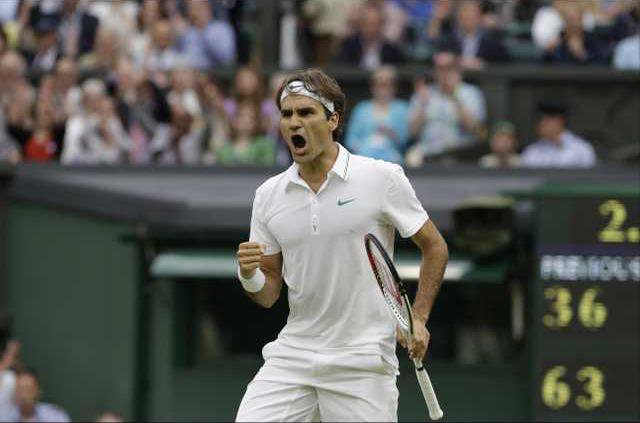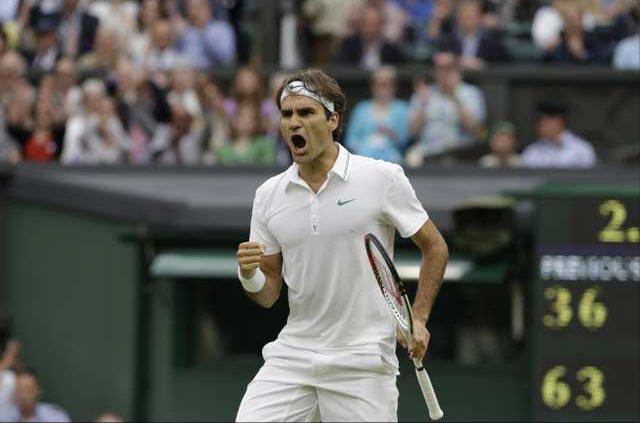WIMBLEDON, England — Roger Federer is back in the Wimbledon final for the first time since 2009. If that seems like a long gap for the six-time champion, imagine how all of Britain feels: Andy Murray is the first man from the host country to play for the title at the All England Club in 74 years.
Both are playing for history.
Already the owner of a record 16 Grand Slam titles, but none in the past 2½ years, Federer can equal two marks held by Pete Sampras with one more victory Sunday: seven Wimbledon championships, and 286 weeks at No. 1 in the ATP rankings. So far 0-3 in major finals, without claiming even one set, Murray can become the first British man to collect any Grand Slam title since Fred Perry won Wimbledon and the U.S. Championships in 1936.
"Everyone loves Roger at Wimbledon, but a majority of people are going to want to see Andy win this time. ... They can inspire Andy. They can pick him up. But at the same time, they might make him feel like he's pulling all the hopes and dreams of a nation on his shoulders. That's a lot to deal with," Sampras said in a telephone interview. "And he has to play Roger Federer, so he'll have his hands full."
Yes, Federer still has Wimbledon.
And Wimbledon still has Federer.
After seeing his grip on the grass-court Grand Slam tournament slip away with a pair of quarterfinal losses the past two years, the third-seeded Federer reasserted himself by beating defending champion and top-seeded Novak Djokovic, 6-3, 3-6, 6-4, 6-3, on Friday.
Djokovic or Rafael Nadal won the nine previous majors, and both surpassed Federer in the rankings. But after losing six of his last seven matches against Djokovic, all on clay or hard courts, Federer had the upper hand on grass, the first time in 27 career meetings they've played each other on that surface.
"People were like, 'How are we going to survive a Wimbledon final without you?'" Federer said, joking about his earlier-than-usual exits in 2010 and 2011. "For me, it was no problem. I went on vacation and relaxed. Of course, it feels great to be in the Wimbledon final."
No need to tell that to Murray.
Not since Bunny Austin in 1938 had someone representing Britain won a men's semifinal at Wimbledon — until, that is, Murray hit a forehand return winner that clipped a sideline to eliminate No. 5 Jo-Wilfried Tsonga, of France, 6-3, 6-4, 3-6, 7-5. It was a thrill-a-minute match, with both players smearing their white uniforms with grass and dirt stains by diving for volleys.
After a replay review to make sure that last shot was in, Tsonga and Murray hugged. The Frenchman put his hand on the scruff of Murray's neck and they had a lengthy chat near the net. Then Murray sat in his sideline chair, tilted his head back and closed his eyes, the sounds of a raucous standing ovation ringing through Centre Court.
"A big relief," Murray said. "It was a very emotional end to the match. I've just got to try to keep it together for the final."
He had lost in the semifinals each of the past three years, part of an 0-11 rut for British men in the final four. For decades, the locals who love their tennis dealt with the angst of seeing their players come so close, yet so far.
"He's got sort of one monkey off the nation's back with the first finalist in 74 years, but I think a good opportunity to kill two birds with one stone," said Tim Henman, a Brit who lost in four semifinals from 1998-2002, twice to Sampras. "It seems like it could be destiny."
Even Prime Minister David Cameron weighed in on what he called the "great news."
"I'll be watching the final on Sunday and like the rest of the country, will be getting right behind Andy Murray," Cameron said in a statement. "I wish him the best of luck."
Murray actually leads his head-to-head series with Federer, 8-7. But Federer won their finals at the 2008 U.S. Open and 2010 Australian Open, the last time he was a Grand Slam champion.
"It's a great challenge, one where I'm probably not expected to win the match, but one that, if I play well, I'm capable of winning," Murray said. "I mean, if you look at his record here over the past 10 years or so, it's been incredible."
Federer reached a modern-record eighth final at the All England Club. He turns 31 on Aug. 8, and would be the first man 30 or older to win Wimbledon since Arthur Ashe in 1975.
"I'm aware that the tournament's not over yet. I didn't break down crying and fall to my knees and thought the tournament is over and I achieved everything I ever wanted," Federer said. "I want to try to play the best possible final I can."
He and Djokovic played with the Centre Court roof shut because of rain early in the day, and the first key moment came about 15 minutes in, with Djokovic serving. He went ahead 30-love, then dropped four consecutive points. Federer got a break point when he flicked a cross-court backhand passing shot and Djokovic missed a volley as he slipped to the turf, caking his lower right leg with white chalk from a line. Djokovic then slapped a backhand into the net to trail 4-2 and hung his head.
Moments later, Federer served out the first set at love, meaning he'd taken 20 of the 24 points on his serve until then.
"He served well," Djokovic said, then amended that assessment: "He served really well."
Playing for history: Federer, Murray advance to Wimbledon final





